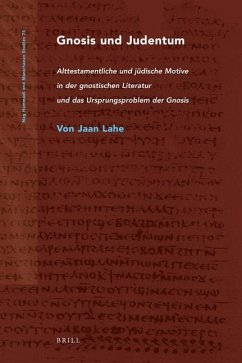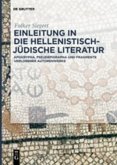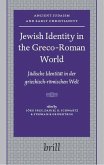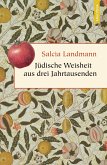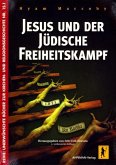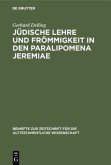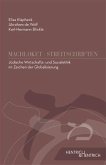This book addresses different theories related to the origin of Gnosticism. The author comes to the conclusion that, if we set aside the Christian substance, in Gnostic literature - besides Platonist philosophy - the most numerous influences come from Judaism. As they have, partially, reached Gnostic literature independent from Christianity, it could validate the theory according to which we should be searching for the origin of Gnosticism in certain Judaist circles. The author analyses the use of lore from the Old Testament and Judaism in Gnostic literature. Even though this does not prove that Gnosticism has evolved from Judaism, it still shows how extensively the Judaist world of thought influenced Gnosticism and how it gives us a reason to ask whether we should consider more thoroughly the theory according to which we should be searching for the founders of Gnostic lore within certain Judaist circles of antiquity.
Über den Ursprung der antiken Gnosis gibt es verschiedene Theorien, aber noch heute herrscht in dieser Frage in der Forschung kein Konsens. Der Autor dieses Buches betrachtet unterschiedliche Ursprungstheorien der Gnosis und kommt zu dem Ergebnis, dass (abgesehen vom christlichen Stoff) neben den Einflüssen des Mittelplatonismus der alttestamentliche und jüdische Stoff in der gnostischen Literatur die wichtigste Rolle spielt. Da der jüdische Stoff teilweise durch die Vermittlung des Christentums in die Gnosis gekommen ist, könnte das die alte Hypothese unterstützen, dass die Gnosis innerhalb des Christentums entstanden sei. Doch gibt es eine Vielzahl gnostischer Texte, die vom Christentum nicht beeinflusst sind, in denen aber der alttestamentliche und jüdische Stoff eine sehr wichtige Rolle spielt. Diese Tatsache könnte nun die zweite alte Theorie unterstützen, nach der die Wurzeln der Gnosis im antiken Judentum liegen. Der Autor der vorliegenden Arbeit analysiert den Gebrauch der alttestamentlichen und jüdischen Überlieferungen undMotive in der gnostischen Literatur und kommt zu dem Ergebnis, dass es nicht letztgültig bewiesen ist, dass die Gnosis aus dem Judentum heraus entstand. Doch zeigt die Untersuchung, wie große Bedeutung die alttestamentlichen und jüdischen Motive in der Gnosis gehabt haben. Dies gibt Anlass zu fragen, ob wir dennoch die Theorie ernsthaft zu erwägen haben, nach der der Ursprung der Gnosis in Kreisen des antiken Judentums zu suchen sei.
Über den Ursprung der antiken Gnosis gibt es verschiedene Theorien, aber noch heute herrscht in dieser Frage in der Forschung kein Konsens. Der Autor dieses Buches betrachtet unterschiedliche Ursprungstheorien der Gnosis und kommt zu dem Ergebnis, dass (abgesehen vom christlichen Stoff) neben den Einflüssen des Mittelplatonismus der alttestamentliche und jüdische Stoff in der gnostischen Literatur die wichtigste Rolle spielt. Da der jüdische Stoff teilweise durch die Vermittlung des Christentums in die Gnosis gekommen ist, könnte das die alte Hypothese unterstützen, dass die Gnosis innerhalb des Christentums entstanden sei. Doch gibt es eine Vielzahl gnostischer Texte, die vom Christentum nicht beeinflusst sind, in denen aber der alttestamentliche und jüdische Stoff eine sehr wichtige Rolle spielt. Diese Tatsache könnte nun die zweite alte Theorie unterstützen, nach der die Wurzeln der Gnosis im antiken Judentum liegen. Der Autor der vorliegenden Arbeit analysiert den Gebrauch der alttestamentlichen und jüdischen Überlieferungen undMotive in der gnostischen Literatur und kommt zu dem Ergebnis, dass es nicht letztgültig bewiesen ist, dass die Gnosis aus dem Judentum heraus entstand. Doch zeigt die Untersuchung, wie große Bedeutung die alttestamentlichen und jüdischen Motive in der Gnosis gehabt haben. Dies gibt Anlass zu fragen, ob wir dennoch die Theorie ernsthaft zu erwägen haben, nach der der Ursprung der Gnosis in Kreisen des antiken Judentums zu suchen sei.
"Lahe presents a very impressive case for the Jewish origin of Gnosticism. In my opinion, this is the most important book on ancient
Gnosticism published in many years." - Birger A. Pearson, University of California, Santa Barbara , in: Religious Studies Review 38/1 (2012)
"eine imposante Zusammenschau der Gnosis-Forschung der vergangenen Jahrzehnte und eine gute Ausgangsbasis vertiefter Einzelstudien zur Bedeutung des jüdischen Hintergrunds gnostischer Anschauungen oder möglicher Parallelentwicklungen gnostischer und jüdisch-christlicher Vorstellungen." - Claudia Losekam, Bielefeld , in: Theologische Literaturzeitung 140 (2015), 9
"The merit of Lahe's study is that it makes clear to what extent gnostic authors made use of biblical and Jewish materials ..." - Roelof van den Broek, in: Vigiliae Christianae 68 (2014)
Gnosticism published in many years." - Birger A. Pearson, University of California, Santa Barbara , in: Religious Studies Review 38/1 (2012)
"eine imposante Zusammenschau der Gnosis-Forschung der vergangenen Jahrzehnte und eine gute Ausgangsbasis vertiefter Einzelstudien zur Bedeutung des jüdischen Hintergrunds gnostischer Anschauungen oder möglicher Parallelentwicklungen gnostischer und jüdisch-christlicher Vorstellungen." - Claudia Losekam, Bielefeld , in: Theologische Literaturzeitung 140 (2015), 9
"The merit of Lahe's study is that it makes clear to what extent gnostic authors made use of biblical and Jewish materials ..." - Roelof van den Broek, in: Vigiliae Christianae 68 (2014)

